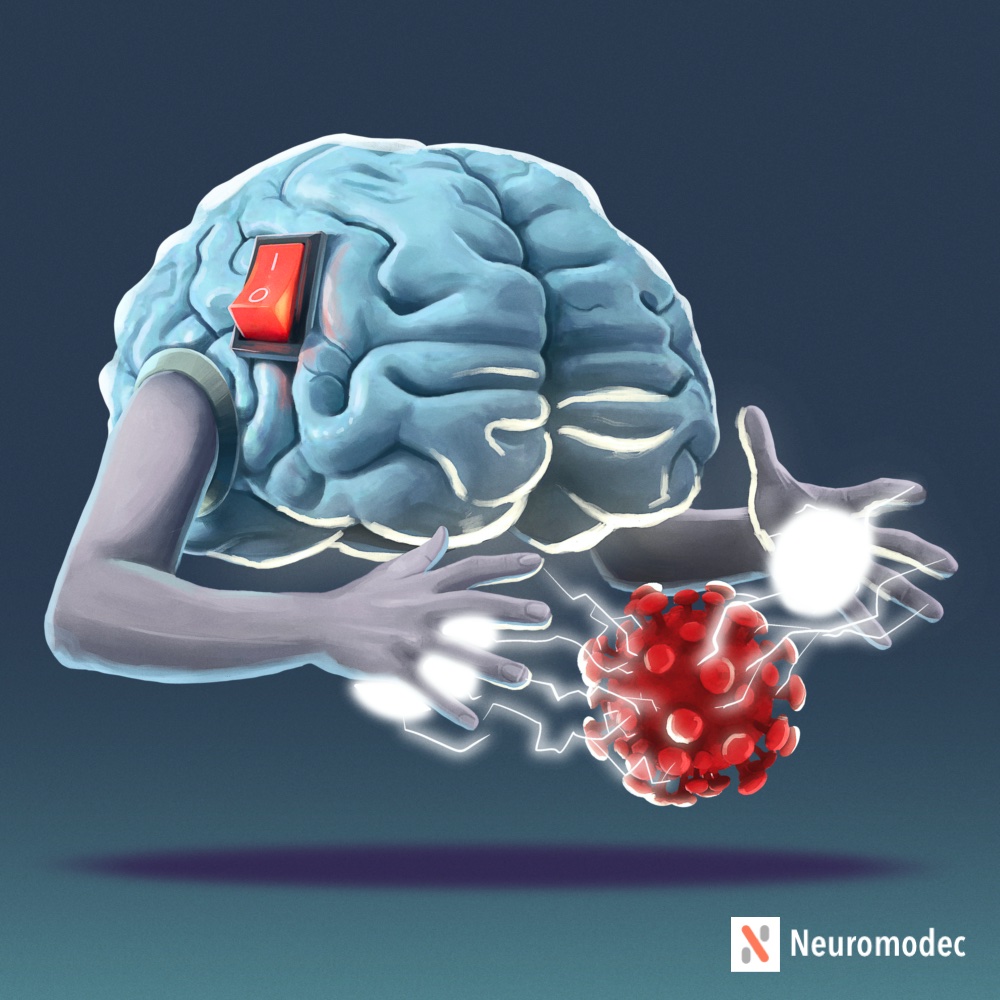
1. Landmark trial shows non-invasive brain stimulation in critically ill COVID-19 patients increases days alive and free of mechanical ventilation.
Acute Respiratory Distress Syndrome (ADRS) due to COVID-19 is associated with muscle fatigue, corticospinal pathways dysfunction, and mortality. High-Definition transcranial Direct Current Stimulation (HD-tDCS) was tested to attenuate clinical impairment in these patients. The “HD-RECOVERY” randomized clinical trial was conducted to evaluate the efficacy and safety of HD-tDCS with respiratory rehabilitation in patients with moderate to severe ARDS due to COVID-19. The result were published in Brain Stimulation journal on May 11, 2022: "Efficacy and safety of HD-tDCS and respiratory rehabilitation for critically ill patients with COVID-19 The HD-RECOVERY randomized clinical trial." In a trial led by Dr. Suellen Marinho Andrade of the Federal University of Paraíba, fifty-six critically ill patients were randomized 1:1 to active or sham HD-tDCS provided twice a day for 30-min a 3mA alongside respiratory rehabilitation for up to 10 days. The primary outcome was ventilator-free days during the first 28 days, defined as the number of days free from mechanical ventilation. Secondary outcomes including delirium, organ failure, hospital length of stay and adverse effects were evaluated. HD-tDCS was delivered at bed-side ICU using a custom portable device and headgear. The trial was pre-registered (ClinicalTrials.gov : NCT05359770) and support by the Brazilian Government of Paraiba. The authors report, active HD-tDCS induced more ventilator-free days compared to sham HD-tDCS. Patients in the active group vs in the sham group experienced lower organ dysfunction, delirium, and length of stay rates over time. In addition, positive clinical response was higher in the active HD-tDCS vs sham group. Adverse events were similar between groups. The authors conclude “Among patients with COVID-19 and moderate to severe ARDS, use of active HD-tDCS compared with sham HD-tDCS plus respiratory rehabilitation resulted in a statistically significant increase in the number of ventilator-free days over 28 days. HD-tDCS combined with concurrent rehabilitation therapy is a safe, feasible, potentially add-on intervention, and further trials should examine HD-tDCS efficacy in a larger sample of patients with COVID-19 and severe hypoxemia.” Full citation: Efficacy and safety of HD-tDCS and respiratory rehabilitation for critically ill patients with COVID-19 The HD-RECOVERY randomized clinical trial Suellen Marinho Andrade, Maria Cecília de Araújo Silvestre, Eduardo Ériko Tenório de França, Maria Heloísa Bezerra Sales Queiroz, Kelly de Jesus Santana, Marcela Lais Lima Holmes Madruga, Cristina Katya Torres Teixeira Mendes, Eliane Araújo de Oliveira,a João Felipe Bezerra, Renata Gomes Barreto, Silmara Maria Alves Fernandes da Silva, Thais Alves de Sousa, Wendy Chrystyan Medeiros de Sousa, Mariana Patrícia da Silva, Vanessa Meira Cintra Ribeiro, Paulo Lucena, Daniel Beltrammi, Rodrigo Ramos Catharino, Egas Caparelli-Dáquer, Benjamin M. Hampstead, Abhishek Datta,Antonio Lucio Teixeira,Bernardino Fernández-Calvo, João Ricardo Sato, Marom Bikson. Brain Stimul. 2022 May-June; 15(3): 780–788. doi: 10.1016/j.brs.2022.05.006
2. Famotidine has been shown to reduce #Covid19 symptoms in controlled randomized trials but the mechanism was previously unknown. Now the data indicates this generic drug activates the vagus nerve to suppress cytokine storm.
Dr. Kevin Tracey of the Feinstein Institute / Northwell Health medical system led a team of scientists presented an subtract at the Experimental Biology meeting publishing (May 13, 2022) “Famotidine exerts anti-inflammatory effects via a vagus nerve-dependent mechanism” in the FASEB journal. Famotidine is a generic histamine H2 receptor antagonist used widely in the treatment acid reflux and gastritis. In prior clinical trials published in 2020 , Famotidine was shown to improve survival and attenuate COVID-19 disease severity. However, the mechanism was then unknown. Using a mouse model, Tracey and team concluded “Famotidine stimulates vagus nerve’s inhibition of LPS-induced TNF release and attenuates lethality in endotoxemic mice. These anti-inflammatory effects require the intact vagus nerve and via a brainstem-dependent mechanism.” The suggestion is that direct vagus nerves stimulation might also provide this therapeutic benefit. Full citation: Famotidine exerts anti-inflammatory effects via a vagus nerve-dependent mechanism Huan Yang, Sam J. George, Dane A. Thompson, Michael Brines, Valentin A. Pavlav, Ulf Andersson, Sangeeta S. Chavan, Kevin J. Tracey. FASEB. 13 May 2022 https://doi.org/10.1096/fasebj.2022.36.S1.R5540
3. NIH expands focused on Long-Covid trough RECOVER initiative
The NIH RECOVER Initiative aims to bring together patients, caregivers, clinicians, community leaders, and scientists from across the nation to understand, prevent, and treat PASC, including Long COVID. This group is called the RECOVER Consortium. The NIH RECOVER initiative is supporting Long-COVID research through several grant mechanisms.
4. Non-invasive VNS for COVID-19: Results From the “SAVIOR I” Randomized Controlled Trial
Severe COVID-19 is characterized by an excessive inflammatory response and emerging evidence from animal and human studies suggests that vagus nerve stimulation can lead to reduced levels of various biomarkers of inflammation. Tornero can team conducted a prospective randomized controlled study (called “SAVIOR-I”) to assess the feasibility, efficacy, and safety of non-invasive vagus nerve stimulation (nVNS) for the treatment of respiratory symptoms and inflammatory markers among patients who were hospitalized for COVID-19. The trial was pre-resisted (ClinicalTrials.gov identifier: NCT04368156). 110 participants were to receive either the standard of care (SoC) alone or nVNS therapy plus the SoC. The nVNS group received two consecutive 2-min doses of nVNS 3 times daily as prophylaxis. Efficacy and safety were evaluated via the incidence of specific clinical events, inflammatory biomarker levels, and the occurrence of adverse events. The authors conclude “nVNS therapy led to significant reductions in levels of inflammatory markers, specifically CRP and procalcitonin. Because nVNS has multiple mechanisms of action that may be relevant to COVID-19, additional research into its potential use earlier in the course of COVID-19 and its potential to mitigate some of the symptoms associated with post-acute sequelae of COVID-19 is warranted.” Full citation: Non-invasive Vagus Nerve Stimulation for COVID-19: Results From a Randomized Controlled Trial (SAVIOR I). Carlos Tornero, Ernesto Pastor, María Del Mar Garzando, Jorge Orduña, Maria J Forner, Irene Bocigas, David L Cedeño, Ricardo Vallejo, Candace K McClure, Christopher J Czura, Eric J Liebler, Peter Staats. Front Neurol. 2022. doi: 10.3389/fneur.2022.820864.